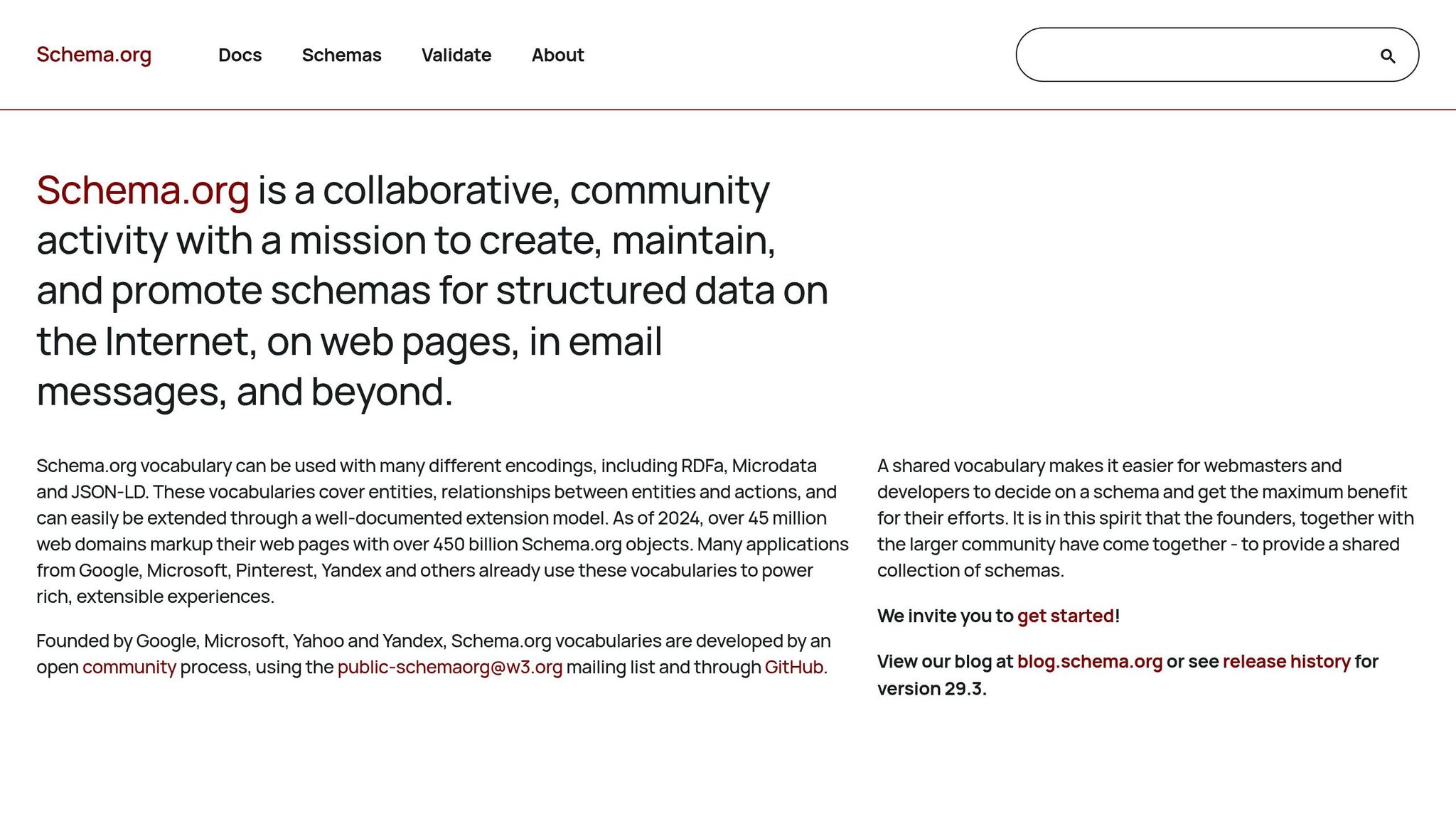Schema markup is reshaping how businesses rank in search results in 2025. It’s not just about better visibility - it’s about standing out with rich snippets, improving click-through rates by up to 35%, and staying competitive in an AI-driven search landscape. Yet, fewer than 30% of websites are using advanced schema tactics, leaving plenty of room for growth.
Here are five strategies to help your site perform better:
- Custom Schema Types: Tailor structured data to niche industries for better search visibility.
- Entity Relationship Mapping: Build connections between content for improved authority and knowledge graph inclusion.
- Dynamic Schema Markup: Automate updates to keep your data current and relevant.
- Schema for Rich Results & Voice Search: Optimize for rich snippets and voice search to engage users directly.
- Validation & Monitoring: Regularly check and optimize your schema to maintain accuracy and performance.
These techniques are key to staying competitive in the evolving search ecosystem. Whether you’re running a local business or a national brand, leveraging schema markup effectively can drive traffic and improve engagement.
The Perfect Advanced Schema Markup Strategy for 2025 | Terry Samuels' Masterclass – Vol 1
1. Custom Schema Types for Niche Industries
Sometimes, the standard Schema.org vocabularies just don’t cut it when it comes to capturing the specific details of certain industries. That’s where custom schema types come into play. These tailored extensions allow businesses in niche markets to provide search engines with highly detailed, industry-specific data.
Schema.org was designed with flexibility in mind, offering a well-documented extension model. This allows webmasters to define entities, relationships, and actions that are unique to their industry. By doing so, search engines can better understand and index your content - paving the way for noticeable SEO gains.
Boosting SEO Visibility
Custom schema types can enhance SEO by offering search engines more precise structured data. This helps them index your content more accurately and may even result in richer, more engaging snippets in search results. To put it into perspective, by 2024, over 45 million web domains are using Schema.org markup, contributing to more than 450 billion schema objects across the web. For niche businesses, this level of detail can mean better visibility and more targeted reach.
Simplifying Implementation with Existing Tools
While the benefits of custom schema types are clear, implementing them does come with technical hurdles. That said, extending existing schema types with specific attributes is manageable, thanks to Schema.org’s detailed extension model and documentation. With the right technical expertise, businesses can integrate these customizations effectively.
Seamless Integration with Schema.org Standards

When done correctly - using proper naming conventions and data types - custom schema types work seamlessly with Schema.org’s standard vocabularies. This ensures compatibility with major search engines like Google, Microsoft, Pinterest, and Yandex. The Schema.org community also plays an active role in ensuring that custom vocabularies align with standard types, making it easier for businesses to adopt these enhancements.
Enhancing User Engagement and Rich Search Features
Custom schema types don’t just help search engines; they also improve the user experience. By enabling more detailed and accurate search snippets, these schemas can make your business stand out in search results. When users see relevant and specific information about your niche offerings, they’re more likely to click through, leading to higher-quality traffic and better conversion opportunities. It’s a win-win for both visibility and user engagement.
2. Entity Relationship Mapping for Knowledge Graphs
Entity relationship mapping takes schema markup a step further by creating clear connections between related entities, such as authors, products, and events. This approach moves beyond basic structured data, forming interconnected networks that search engines use to develop detailed knowledge graphs.
At the core of this method is Schema.org's built-in support for entities and their relationships. According to the official documentation:
"Schema.org vocabulary can be used with many different encodings, including RDFa, Microdata and JSON-LD. These vocabularies cover entities, relationships between entities and actions, and can easily be extended through a well-documented extension model."
Search engines rely on these standardized relationships to build expansive knowledge graphs. Establishing these connections not only increases visibility but also strengthens user engagement, a topic explored further below.
Boosting SEO Visibility
By helping search engines understand the broader context of your content, entity relationship mapping enhances both authority and relevance. Properly mapping these relationships creates a semantic network that highlights your expertise across related topics. This, in turn, strengthens topical authority and improves contextual relevance.
Simplified Implementation with SEO Tools
Modern AI-powered SEO tools like WordLift, InLinks, and Schema App make entity recognition and mapping more accessible. These platforms utilize semantic web technologies and knowledge graphs to automate the process, saving time and effort while improving SEO outcomes.
Seamless Integration with Schema.org Standards
Entity relationship mapping aligns perfectly with Schema.org standards and is widely recognized by major search engines, including Google, Microsoft, Pinterest, and Yandex. This compatibility ensures that your structured data delivers enhanced and extensible search experiences.
Enhancing User Engagement and Search Features
Beyond the technical advantages, these semantic connections significantly improve user engagement. They enable search engines to create richer search result features, such as enhanced snippets and knowledge panels, that make your content stand out. Additionally, these connections help your content appear for related queries, broadening its reach and driving more interaction. By refining your structured data, entity relationship mapping keeps your SEO strategy aligned with the advanced demands of 2025.
3. Dynamic Schema Markup for Real-Time Updates
Dynamic schema markup takes structured data to the next level by automating updates whenever your content changes. Unlike traditional schema markup, which requires manual adjustments, this approach ensures that search engines always have the most current information. This is especially important for industries like news, e-commerce, and real estate, where information changes frequently. By using custom types and entity mapping, dynamic updates keep your structured data accurate and relevant in real time.
Effectiveness in Improving SEO Visibility
Keeping structured data up to date isn't just convenient - it’s a game-changer for SEO. Dynamic schema markup helps search engines better understand your content by consistently providing accurate context, entities, and relationships. This builds trust with search engines, strengthens your topical authority, and boosts your site’s relevance. These factors are essential for climbing search rankings and enhancing overall visibility. With so many websites already leveraging structured data, dynamic updates can give your site a competitive edge.
Ease of Implementation with Existing Tools
You don’t need to start from scratch to implement dynamic schema markup. Tools like Schema App and WordLift make the process seamless. Schema App is perfect for large websites with frequently updated content, automating structured data updates to save time and effort. WordLift, on the other hand, uses AI and semantic web technologies to adapt schema markup automatically as your pages evolve. These tools eliminate manual work and minimize the risk of outdated data harming your SEO performance.
Compatibility with Schema.org Standards
Dynamic schema markup works hand-in-hand with Schema.org vocabularies, supporting formats like RDFa, Microdata, and JSON-LD. Major search engines - including Google, Microsoft, Pinterest, and Yandex - rely on these standards to deliver enriched search results. As Schema.org continues to expand its vocabulary, dynamic tools ensure your structured data stays aligned with the latest updates, maintaining compatibility with evolving search engine requirements.
Impact on User Engagement and SERP Features
Accurate, real-time updates through dynamic schema markup can significantly enhance how your content appears in search results. Rich features like snippets, knowledge panels, and other enhanced elements become more appealing and informative, leading to higher click-through rates. For example, up-to-date product prices, availability, and event details reduce user frustration while boosting engagement. This real-time accuracy not only improves user satisfaction but also helps search engines better understand your content, leading to broader exposure and increased interaction across search platforms.
sbb-itb-5be333f
4. Schema Optimization for Rich Results and Voice Search
Schema optimization goes beyond basic markup to enhance your content's visibility and performance in both rich results and voice search. It’s about crafting structured data that helps search engines understand your content better, making it stand out in search results and providing accurate responses for voice queries. A key part of this is identifying which schema types trigger rich features and how voice assistants use this data to deliver information.
Effectiveness in Improving SEO Visibility
Rich results are a game-changer for visibility, showcasing elements like star ratings, images, prices, and snippets directly in search results. With the growing use of voice assistants for quick answers, aligning your structured data with voice search needs is becoming essential. When done right, structured data can help search engines pull precise details - whether it’s a recipe, an FAQ, or product information - allowing you to connect with a broader audience.
Schemas designed for recipes, FAQs, and products are particularly effective. They provide detailed, user-focused information like cooking instructions, direct answers to common questions, or real-time pricing. This level of precision not only attracts qualified traffic but also ensures your content integrates smoothly with universal standards.
Compatibility with Schema.org Standards
Sticking to Schema.org standards is critical. This shared vocabulary is what major search engines rely on to interpret structured data. By adhering to these guidelines, you can make the most of your structured data efforts, increasing your chances of appearing in rich results. For voice search and AI-generated outputs, Schema.org compatibility ensures that search engines understand the context and specifics of your content, making it more relevant in these formats.
Impact on User Engagement and SERP Features
Accurate schema markup doesn’t just help search engines; it also boosts user engagement. Rich results, like review schemas showing star ratings or event schemas with dates and locations, provide users with valuable information upfront. This added context encourages higher click-through rates and helps users quickly decide if your content meets their needs.
When it comes to voice search, schema markup plays a unique role. Voice assistants that cite your structured data not only improve user trust but also enhance your brand’s authority. Meanwhile, the visual appeal of rich results sets clear expectations for users, reducing bounce rates and encouraging them to explore your content further.
5. Schema Validation and Performance Monitoring Methods
After implementing advanced schema strategies, maintaining their accuracy and monitoring their performance is crucial for achieving long-term SEO success. Regular validation and consistent monitoring ensure your structured data remains effective, helping you avoid unnoticed errors and missed growth opportunities. This process involves verifying the accuracy of your markup, tracking its impact, and making informed adjustments to refine your SEO efforts.
How It Boosts SEO Visibility
Using tools like Google’s Rich Results Test and Schema Markup Validator helps you catch errors that might prevent your content from appearing as rich snippets. Monitoring performance metrics - such as click-through rates (CTR) on rich results versus standard listings - can highlight which types of schema are driving traffic and engagement. Real-time alerts are particularly useful for spotting and resolving issues quickly, ensuring your search visibility isn’t compromised. This attention to detail is key to maintaining the high standards set by your initial schema strategies.
Simple Integration with Existing Tools
Schema validation doesn’t have to be complicated. Tools like Google Search Console provide built-in schema monitoring through its Enhancement reports, showing you which pages have markup issues and how rich results are performing. For more in-depth analysis, tools like SEMrush Site Audit and Screaming Frog can crawl your site, flag schema errors, and help you prioritize fixes based on their impact. You can also set up monitoring scripts to keep an eye on key pages and receive alerts when validation statuses change, ensuring problems are addressed before they escalate.
Staying Aligned with Schema.org Standards
Validation tools ensure your markup aligns with Schema.org guidelines, which search engines rely on. This involves checking required properties, confirming correct data types, and verifying that nested schema relationships are structured properly. JSON-LD syntax validation is particularly helpful for spotting common mistakes, like missing commas or malformed URLs, that could disrupt your schema. Since Schema.org standards and search engine guidelines evolve over time, regular audits are essential to keep your markup compliant without requiring constant manual updates.
Enhancing User Engagement and SERP Features
Accurate schema markup doesn’t just improve search visibility - it also enhances user engagement. For example, review schemas with precise star ratings can build trust and encourage clicks. By continuously monitoring performance and validating your schema, you’re not only optimizing for search engines but also creating a better experience for users. This dual focus ensures your site remains competitive and aligned with ever-changing search standards.
Strategy Comparison Table
The table below provides a clear side-by-side comparison of various schema markup strategies, highlighting their strengths, challenges, and technical requirements. Selecting the best approach depends on your business goals, available resources, and SEO priorities. While each strategy offers distinct benefits, they also come with specific hurdles that require careful consideration.
| Strategy | Pros | Cons | Requirements | Recommended Tools |
|---|---|---|---|---|
| Custom Schema Types for Niche Industries | Tailored to specific industry needs, boosts relevance for specialized searches, enhances SERP visibility | Requires ongoing updates and ensuring universal support | Advanced understanding of schema.org, JSON-LD, and industry-specific data; development expertise | Google's Structured Data Markup Helper, Schema.org generators, custom JSON-LD editors |
| Entity Relationship Mapping for Knowledge Graphs | Improves content context, supports E-E-A-T, strengthens authority in Google's Knowledge Graph | Complex to implement, demands precise entity identification, errors can mislead search engines | Expertise in entity extraction, semantic relationships, and collaboration between SEO and content teams | Knowledge graph visualization tools, entity extraction APIs, semantic analysis platforms |
| Dynamic Schema Markup for Real-Time Updates | Keeps data updated, ideal for events or inventory, enhances click-through rates for time-sensitive content | Requires automation, robust backend integration, and frequent validation | Automated CMS or backend integration, scripts for automation, real-time data feeds | CMS plugins (e.g., WordPress schema plugins), automation scripts, API integrations |
| Schema Optimization for Rich Results and Voice Search | Improves chances of rich snippets and voice search features, boosts user engagement and traffic | Highly competitive, strict guidelines must be followed, improper use can result in penalties | Detailed content analysis, adherence to Google's structured data guidelines, regular updates | Google Search Console, Rich Results Test, voice search testing tools |
| Schema Validation and Performance Monitoring | Ensures accuracy, minimizes errors, tracks SEO impact | Requires ongoing effort, technical tools, and expert oversight | Access to validation tools, analytics platforms, and regular audit processes | Google Rich Results Test, Schema Markup Validator, SEO analytics suites |
This comparison highlights the core attributes of each schema strategy, but their complexity and resource demands vary. For instance, custom schema types and entity relationship mapping require advanced technical skills and collaboration, making them best suited for businesses with dedicated development and SEO teams. In contrast, validation and performance monitoring are more accessible, even for those with basic SEO knowledge. Dynamic schema markup lands in the middle, balancing technical integration with established frameworks.
Resource allocation plays a huge role in choosing the right strategy. For example, custom schema types are particularly effective for niche industries aiming to dominate specialized searches. Businesses focused on building authority or improving local visibility should prioritize entity relationship mapping or local business schema. Meanwhile, e-commerce platforms and event-driven websites often see the greatest benefits from dynamic schema markup, which ensures real-time updates for inventory and events.
Timelines for implementation differ widely. Optimizing for rich results might take a few weeks, while developing custom schema types could stretch over several months. Regardless of the strategy, robust validation and regular performance monitoring are critical starting points. For further tool recommendations, visit The Top SEO Marketing Directory.
Conclusion
Effective schema markup continues to be a cornerstone of SEO success in 2025. By adopting advanced strategies, businesses can gain a competitive edge in search rankings and improve user engagement. Moving beyond basic implementations, structured data helps capture more qualified traffic through enhanced search features, offering businesses a tangible way to stand out.
The strategies outlined cater to different needs and technical capabilities. For niche industries, custom schema types can boost specialized search visibility. Entity relationship mapping strengthens authority by connecting to knowledge graphs. Dynamic schema markup ensures time-sensitive content stays relevant, while rich result optimization directly impacts click-through rates. Regular performance monitoring ensures these efforts remain effective over time.
The key to success lies in aligning schema tactics with your resources and goals. Larger companies with in-house development teams can tackle complex implementations like custom schema types and entity mapping. Smaller businesses, on the other hand, may find value in starting with rich result optimization and focusing on validation. Regardless of the approach, consistency and accuracy across all structured data are critical.
To maximize results, businesses can turn to expert tools and agencies, such as those featured on The Top SEO Marketing Directory. Leveraging these resources ensures schema markup remains effective, even as search algorithms evolve.
With the rise of AI and voice search, comprehensive schema strategies are more important than ever. Over 45 million domains now use schema markup, with JSON-LD leading the way due to its compatibility with modern web technologies. Businesses that prioritize well-structured data will increasingly outperform those relying on outdated SEO tactics.
Finally, staying updated is crucial. Schema standards and search engine algorithms are constantly changing. Regularly validating and refining your schema practices ensures your business maintains strong search visibility and continues to engage users effectively.
FAQs
How do custom schema types boost SEO for specialized industries?
Custom schema types play a key role in boosting SEO for niche industries by offering search engines highly detailed and structured data about your business or content. This added layer of detail makes it easier for search engines to interpret your website, leading to better indexing and improved visibility in search results.
For industries with specialized needs, custom schema types let you spotlight unique elements like specific services, certifications, or products that set your business apart. This can increase your chances of showing up in rich search results, such as featured snippets or knowledge panels, which are excellent for drawing in more targeted traffic. By crafting schema markup tailored to your niche, you're not just enhancing your SEO - you’re also providing potential customers with the exact information they’re looking for.
What are the best tools for adding dynamic schema markup to my website?
Dynamic schema markup plays a key role in improving your website's SEO by giving search engines access to well-organized data. To simplify the process, many tools are available. For instance, CMS platforms like WordPress offer plugins such as Yoast SEO and Rank Math, which include built-in schema markup capabilities. If you're looking for more advanced options, tools like Google's Structured Data Markup Helper or Schema Pro can help you create and test schema code effectively.
It's crucial to verify your schema markup to ensure everything is set up properly. Tools like Google's Rich Results Test can confirm that your implementation meets search engine requirements.
Why is it important to regularly validate and monitor schema markup for SEO success?
Keeping your schema markup in check with regular validation and performance monitoring is key to making sure your structured data stays accurate and meets search engine requirements. If there are errors in your schema, search engines might struggle to interpret your content correctly, which could affect how your pages show up in search results.
By keeping an eye on performance, you can spot areas where your schema could use some fine-tuning, stay ahead of changes in search engine algorithms, and keep your competitive edge intact. When schema markup is properly set up and maintained, it can boost your visibility with rich snippets, attract more traffic, and encourage better user interaction.


